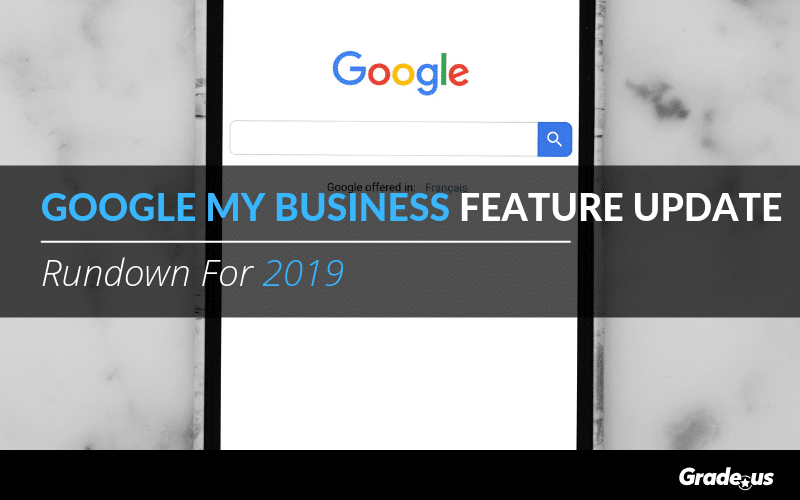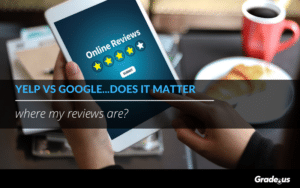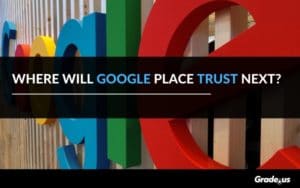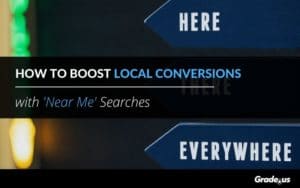Marketers and business owners have always had sort of a devil's bargain with Google. Feed the beast and the beast feeds you back.
But the beast is chimera: constantly morphing, changing, and demanding new strategies and responses. Sometimes the changes are helpful and kind. Other times? Not so much.
That chimera? He's been making a lot of changes recently. Here's a rundown on some of the latest features, as well as some action plans for responding to them.
Before diving into these features and updates, one HUGE caveat:
Don't always apply new features immediately. Google does glitch out sometimes, and experimenting with new features can sometimes have some unintended consequences. When Google is slow to respond (as of late June 19, there was a delay of 2-3 weeks with Google My Business related support), it can have a devastating impact on your business or your clients.
The best place to stay in the loop for GMB related issues (outside of Google support) is the Local Search Forum - moderated by Joy Hawkins and her team at Sterling Sky.
The New Branded Mobile Layout
If you search for a business on your mobile phone, you're now going to get an interesting new layout, one that combines your GMB listing with other, organic results.
Greg Gifford over at Wikimotive put together this excellent video where he scrolls through the whole thing:
If you can't watch a video right now, here are the highlights:
- The top half of the maps result stays the same
- A navigation bar will “lock in” at the bottom of the screen as you scroll down. The bar includes the options: Overview, Posts, Reviews, About.
- You’ll see a couple of standard organic listings beneath the knowledge panel.
- Then Q&As pop up again.
- Then you get the aggregated reviews from other sites.
- Popular times to visit is next.
- Organic results again, which may or may not be yours.
- Carousels for other, similar places.
This only works on branded searches.
The Good
As far as serving the end user goes, this is pretty cool stuff. It really does present all the information you could possibly want about a business, as well as some alternatives.
It's a smart way to lead customers to more information if they want it while giving them succinct answers to the most important information.
The Bad
Like many of Google's new features, this may hurt your business as much as it helps. It's taking a listing that used to be yours, and yours alone, and is creating the potential to sprinkle a lot more competitor information into it.
They were already slipping in a good deal more competitor information than anyone wants as it is. Even sometimes starting to show competitor ads, which is less than ideal.
The Response
There are three things you need to do here.
1. It's counter-intuitive in an age where Google is striving to make your website irrelevant. But this is a good time to audit your own, and maybe change your content strategy. Those "Ten Reasons You Really Shouldn't DIY Electrical Work" blog posts aren't going to cut it anymore (sorry). Why are you doing this? Because there are four organic search results in your mobile GMB page now, and you want to dominate all four of them.
2. If your review strategy has been 100% Google-centric so far, it's time to diversify a little. Find the top review sites for your industry and start sending customers to those sites, too. Otherwise, there's not going to be anything for them to see on the aggregate scores from other sites panel. You should be doing this anyway, as some users do use these industry-specific directories instead of Google.
3. You absolutely must start using every feature on your GMB profile. Posts, Q&As, all of it. If anything is blank, do something about it. If you can add a thing, add it. If you're not sure what to put, get some help. But do not leave it blank. Blank spaces are more unattractive than ever on this new layout.
Will Google keep it? Your guess is as good as mine...but these three responses are a good idea anyway.
Custom Short URLs
You can now create a customized short URL for your Google My Business page. It will look like this:
g.page/yourcustomnamehere
To do this, you just log into your Google My Business profile, and then scroll down to the info option right above your website URL.
Hit "Edit," and you'll see a box like this one:

If you have multiple locations, you will have to claim the short URL for each location.
The Good
Branding is always a good thing, and the short URLs will allow people to bookmark your GMB profile just like they might bookmark your webpage.
That means they can call up directions to your location, or your phone number, at the touch of a button instead of running a new maps search—and maybe finding a competitor—every time they need your services.
In a sense, it offers a little protection from algorithm changes by giving your most loyal customers a straight shot to all that information.
You can also use the short URL on your offline marketing materials. You may want to resist the urge to do it.
And it is definitely a quick, easy way to send people to leave reviews on your GMB page.
The Bad
It's yet another example of Google making its best attempt to be pretty much the only website most people ever visit. This change further tightens the grip Google has on businesses.
As of right now, as best as I can tell, the short URL doesn't even show up anywhere unless you give it out to customers. Whether fickle Google will change that in the future, or do something to give these short URLs a bigger role in the future, I couldn't say.
The Response
First and foremost, go claim a short URL. You might not love it, but you probably should have one anyway. Once you claim it, it's yours as long as you don't change it.
Second, decide how you are going to use the URL. I personally would advise against using it on your marketing materials. Direct people to your website instead. You still own that, and you get way more chances to make a case for doing business with your company on your own web property.
Use it when you ask for reviews. It's little and cute and people get it right away.
Google's Marketing Kit
This is a feature that's been around for a while now, but Google's addicted to name changes and this is what it's called now. It used to be called "Small Thanks."
But even though it's been around awhile, few business owners seem to know about it.
Right now you can use the feature to create custom posters and social posts from reviews and highlights on GMB. You can change the style and the color to match your brand.
You can also get a bunch of printable posters, signs, stickers, or table tents.
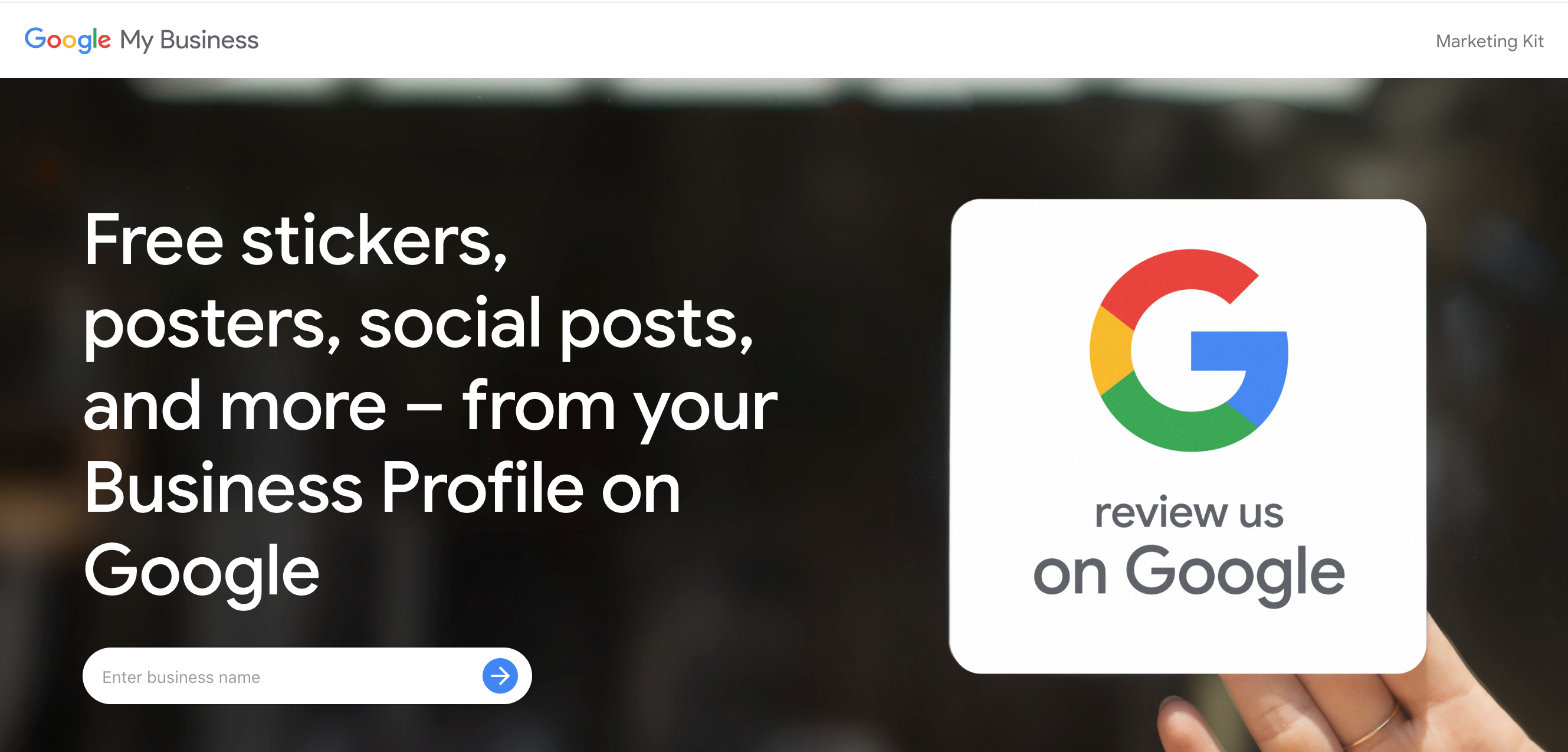
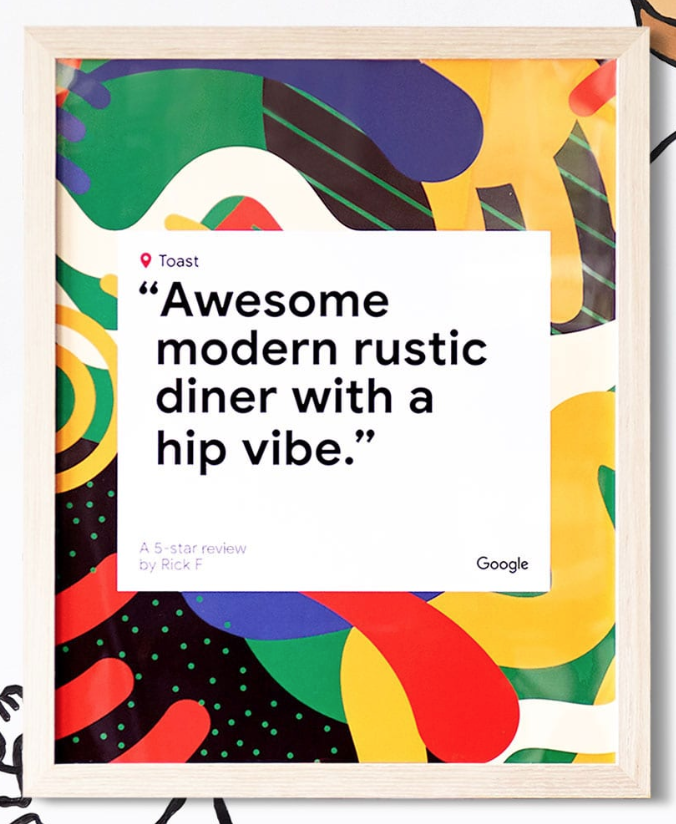
The Good
Free marketing materials and a snazzy way to showcase reviews? I probably don't have to explain why this is pretty cool.
The Bad
Don't get too attached, because this seems like exactly the sort of feature Google will want to monetize later. See below.
The Response
Obviously, you're going to want to play around with this a bit. For one thing, it fits right in to what Eric Shanfelt told us during his interview: that the best response to voice search is to make sure all of your branding and logos are consistent across every single platform: street signs, menus, online properties, all of it. Taking that branding right down to your Google posts is the smart thing to do.
If you're not getting the kind of reviews you'd want to showcase with those posts, then it's way past time for you to alter your review strategy until you get the kinds of results you want.
Possible Pay to Play Features, A.K.A. The Ugly
Not long ago, Google sent a bunch of business owners a survey which seemed to make it blatantly clear that they're trying to figure out the best way to monetize GMB.
Rumors about this are running rampant. The experts who have been watching this seem to fall into one of three camps:
- Google’s going to make it all pay-to-play.
- Google will offer some paid features and some free features.
- Google isn’t going to go through with it.
Personally, I fall into that middle camp. But falling into that camp does not give me any illusions that this will be a good thing for business owners, particularly small business owners. Andrew Cock-Starkey of Optimisey outlined exactly why this is going to really hurt Mom & Pop shops in particular.
Andrew also outlined all the features that may or may not cost money if and when Google does roll out paid GMB services. And there are quite a few of them nobody in their right mind would even want, such as letting Google automate your review responses. Spoiler alert: that's a bad idea.
See "15 Ways to Spice Up Positive Review Responses," and "9 Industry-Specific Review Response Templates for Negative Reviews" to see exactly why.
I can't think of anything good about this change. If it's happening at all, it all looks pretty dismal. So here, it's all about the response.
First, take a look at Phil Rozek's post: "Your Bunker Plan If Google Decides to Push the Google My Business Pay-to-Play Button."
Second, look for some ways to diversify your marketing. If you're a small, local business, take heart in the fact that there are people who want to shop at small, local businesses. Look for local directories, newspapers, and magazines where you can increase your presence. Sponsor some local events or run a few of your own.
Get laser-focused on giving people a reason to visit your site and your store that does not rely on Google. If you have the energy, time, and the budget, supercharge your content strategy to see if you can't grab some of those organic listings, which are at least more relevant on mobile than they used to be (for now).
Response, Redux
When Cori Graft of Seer Interactive and I had our conversation, we talked briefly about the possibility that Google will topple under its own weight.
Some of the features they're offering continue to be good, useful, and helpful, as shown above.
But Pay-to-Play could be a very bad move for them. Hearing Google described as "Yelp on steroids" doesn't bode well for them...Yelp's in bad shape. Facebook thought they were invincible too, and businesses are now leaving it in droves. Yahoo used to be the predominant search engine, not Google. Today it's, "Yahoo, who?"
There are already a whole lot of people who are unhappy with Google for shoving aggregate site results into their GMB pages, for showing competitor results on their pages, and for doing everything in their power to keep customers off their websites.
It seems to have a stranglehold on everything. Like they're the Kings of the World, and can do whatever they want. And this survey has stirred up a lot of resentment that has painted Google as greedy and even sinister. A company which has it out for small businesses and who doesn't care who they hurt as long as they make more money.
Their motto used to be "don't be evil." Then they dropped it. From their advertising. From their code of conduct.
This seems exactly the sort of situation that could give some clever alternative provider an opening to spawn new solutions, things which might ultimately make Google less relevant. Or even irrelevant.
I can imagine a time where I'll be able to look at an AI and say, "Hey, find me three local Bed and Breakfasts in the state of Maine who have a great reputation, and where I can sit in a hot tub, get giant towels, and eat farm fresh food," and then have a conversation with said AI about the pros and cons of each option which draws on both reviews and site data. And doing it without ever having to see irrelevant hotel competitors, spammy ads, or fake reviews. Maybe Google will be the one, but maybe it will be someone else.

It seems impossible now, but part of your response should be to pay closer attention than ever to any innovators who might come along, and to think about how you might take advantage of those innovations.
But in the meantime...
In the meantime, tracking Google's changes and figuring out how to respond to them remains mission critical for everyone. Keep watching and adjusting your response to keep yourself in the best position possible.
About the Author
Raney C. Hudson
Raney C. Hudson is an independent content consultant with a 10+ year track record in the digital marketing industry.

